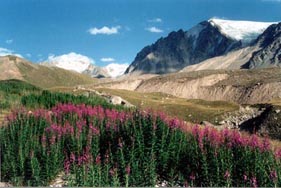Massive Kazakhstan ski development may cause environmental abuse

Enormous Central Asia ski resort slammed by campaigners: what is more important they say: profit for a few businessmen or enjoyment for all”
Kazakhstan’s mass media have been euphoric recently about a huge tourism project that could damage the country’s sensitive ecological heritage. The state and the ministry of tourism has given top priority to the transformation of some 3100 hectares of pristine woodland into the biggest ski resort in Central Asia.
The biggest and probably one of the most contested tourism projects in Kazakhstan is the transformation of 3100hectares of woodland in the south of Almaty into the biggest ski-resort in Central Asia. 300km to 500km of skiing slopes with corresponding infrastructure may be built at heights between1600m to 3100m.
The designers of this immense skiing resort say that there are up to 1.2 billion people in source markets (including China and India) and think that this potential target market will inject money into Kazakh finances.
“Nevertheless” say campaigners, “it is more than doubtful, whether these plans are realistic. China and India have themselves developed huge skiing resorts or they are about to do so.”
Kazakhstan’s minister of finance has been asked by the Kazakh Senate to provide 3 billion Kazakh Tenge ($20 million) for the first implementation phase of this mega project. However, he has declined, saying that the project was not thought through economically. But it is assumed that the group of politicians and businessmen interested in the project will continue to press ahead with their idea.
In 2008, a law concerning national parks was adapted to enable investors to rent parts of the national parks and to construct ‘touristic objects’. Already at that time, experts such as the NGO “Green Salvation” were warning of a sell-out of the national park under the disguise of state interests.
The land envisaged for the project – south of Almaty – is part of the Ile-Alatau national park, a big and partly wooded protected area, which is already suffering considerably under anthropogenic influences.
Almaty, a metropolis with two million inhabitants, was the Kazakh capital but this was moved north to the new city of Astana by the current president, partly because of the city’s smog and it desperately needs the wooded area to keep the atmosphere healthy.
Campaigners are mounting various other arguments against the planned monster-skiing resort.
Downhill skiing is an expensive sport, they say, which can be afforded by maximum 5% of the Kazakh population. An average income of $500 per month does not even allow most Kazakh families a cheap getaway. The skiing resort could become a complete flop. They say that for the Asiatic winter games several winter sports facilities were constructed in Almaty’s surroundings, which are still not working at full capacity. At the moment Shymbulak and Tabagan winter sports facilities are running at a maximum of 50% occupancy rate.
The proponents of the project forecast a local income of $15bn per annum which would need at least 100 million tourists leaving $150 each in the destination. The campaigners say that in 2010, all of Kazakhstan had only 172.000 domestic tourists and 39.700 international tourists.
“Only on the weekends, the resorts have to handle a heavy rush, during the week things come to a standstill. This proves that the population of Almaty is the only target group.”
The opponents also say that: “for the development of a balanced tourist product in Kazakhstan it would be necessary to create an offer for all classes of population in all parts of the country. Until now, the territory “Kok Zhaylau”, which is foreseen for the skiing resort, is the most popular local recreational area for the less well-heeled city dwellers. All other valleys in the surroundings of the metropolis were closed because of border zone, privatised or repurposed for expensive leisure activities.”
According to conservationists the territory is in a danger zone of land flows and avalanches. If the forest is lumbered for a skiing resort or just decimated, the danger of landslides will increase enormously. In Central Asia sudden snow melt in spring is very common due to the continental climate.
Without the existing carpet of vegetation the masses of melting water can quickly develop into a fatal land- or mud flow. Disasters like that have happened repeatedly in the past 50 years.
The conservationists are also keen to protect the large occurrences of the protected wild apple ‘Malus Sieversi’ which still exist in the lower areas. This important indigenous wild apple gene pool, has been depleted in recently by 70 percent through uncontrolled construction. The richness of species in the different vegetation zones in the Ile Alatau national park is also of such importance that UNESCO has included the territory in the tentative list of world heritage since 2002. http://whc.unesco.org/en/tentativelists/1681
Say the conservationists “There are also legal reasons for stopping the project – in 2005-2007 two consulting firms working on behalf of construction firms have developed recommendations for a huge skiing resort in the area.”
“They have pictured elite houses which are supposed to be constructed on a plateau in this area of outstanding beauty and it was stated that the juridical basis was ‘in progress’. The adapted law on national parks, however, does not foresee the construction of housing space in a protected area.”
“ What is more important?” they say “Profit for a few businessmen at the cost of others and the nature – or nature for everyone?”
Valere Tjolle
Valere is editor of the Sustainable Tourism Report Suite 2011 Get your copy at a special offer price: HERE
 United Kingdom
United Kingdom United States
United States Asia Pacific
Asia Pacific












































Dozens fall ill in P&O Cruises ship outbreak
Turkish Airlines flight in emergency landing after pilot dies
Boy falls to death on cruise ship
Unexpected wave rocks cruise ship
Woman dies after going overboard in English Channel